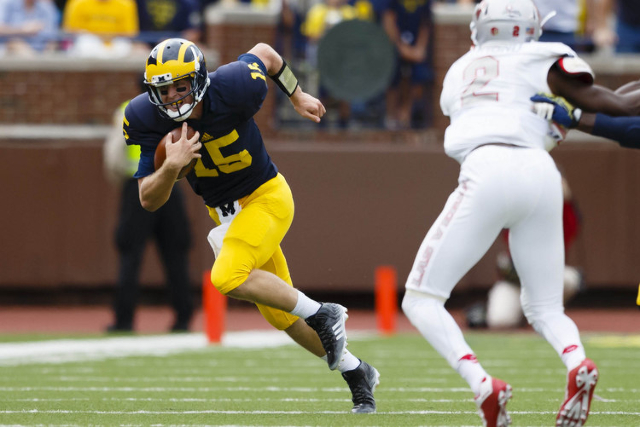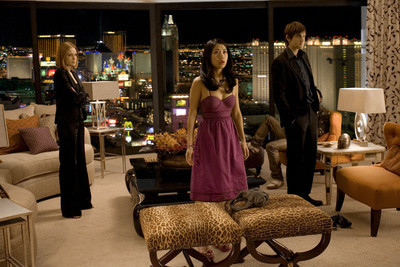PUTTING THEIR CARDS ON THE TABLE
It's time to lay the cards on the table. On the big screen, at any rate.
Starting Friday and extending through late April, a trio of gambling-themed movies (two of them made in Vegas) will hit theaters.
First up: Friday's "The Grand," an improvisational "mockumentary" set at a fictional poker tournament, returns to Las Vegas following its local debut at last year's CineVegas film festival.
Next week, blackjack joins the lineup with "21," based on Ben Mezrich's best-selling "Bringing Down the House," about an MIT professor (played by two-time Oscar-winner Kevin Spacey) who transforms gifted math students (led by Jim Sturgess and Kate Bosworth) into expert card-counters who win big -- and attract the attention of a menacing casino enforcer (Laurence Fishburne).
Poker, meanwhile, returns to the spotlight April 25 in "Deal," about a hot-shot Yale student (Bret Harrison) who teams up with a retired poker legend (Burt Reynolds) to take the pro circuit by storm -- until the two face off in the World Poker Tour championship.
"Poker's obviously one of the hottest games, one of the hottest sports, in the world right now," observes actor Vince Van Patten, now in his fifth season as host of GSN's "World Poker Tour," who plays himself in "Deal."
And while poker ranks as "the best backdrop in the world for a feature film," Van Patten says, merely depicting the game isn't enough for him. "I'm looking for something deeper that hits home," he says. Something "that's real, about real people."
The poker tournament depicted in "The Grand" couldn't possibly be more real.
That's because the actors actually played a real poker game during the climactic tournament scene, notes actor Richard Kind, who joined Woody Harrelson, Dennis Farina, Cheryl Hines, Chris Parnell and David Cross at "The Grand's" final table.
"And I played in character, which was sort of weird," Kind adds. "My behavior was different ... I don't think I played it right." (Full disclosure: Kind and I have been pals since our days at Northwestern University.)
Authenticity is all well and good, but any gambling movie "has to be about the people," Kind adds, citing the 1974 classics "The Gambler" (starring James Caan) and "California Split" (with George Segal and Elliott Gould) as successful character-driven tales. (Another classic poker drama: 1965's "The Cincinnati Kid," with Steve McQueen as the lone-wolf title character and Edward G. Robinson as the wily master of the game.)
To "21" director Robert Luketic, gambling movies that focus too much on the play and not enough on the player(s) qualify as "hardware over 'heart'-ware," he says.
Although "gambling movies have been part of the cinematic landscape for decades," not all gambling movies are created equal, according to Paul Dergarabedian, president of the box-office tracking firm Media by Numbers.
In some cases, "gambling is very much of a backdrop," Dergarabedian says. "In other movies, it's all about gambling. The ones that work are the ones that combine gambling" with other elements.
That's the formula "21" follows, Luketic explains, reasoning that "seeing the mental process" behind the MIT math students' preparation would "be more interesting" for audiences, likening it to "the foreplay before the game."
Besides, directing a movie that centers on blackjack rather than poker provides a particular challenge, the "21" director acknowledges.
For one thing, "there aren't many movies about blackjack."
For another, unlike poker, "blackjack is not a spectator sport. It's more of a thrill to play it" than to watch it, he says. "We're not looking for anyone's poker face."
But poker players who watch poker movies often look for, and at, elements the average moviegoer may miss.
"Poker players have very careful eyes," says Van Patten, who's just published his first poker novel, "The Picasso Bluff," and is working on a second. After all, "we know when we're being bluffed."
As a result, it's difficult for poker experts to suspend their disbelief.
Take Mori Eskandani, president of POKER-PROductions, which produces NBC's "Poker After Dark" series.
While most moviegoers found the high-stakes game James Bond played in 2006's "Casino Royale" very suspenseful, to Eskandani "the poker was just as unbelievable as four jetliners colliding in midair," he says. "Filmmakers always like to sensationalize scenarios."
Even so, "it never hurts to have poker in movies like James Bond," he admits.
It also never hurts to have gambling movies take place in Las Vegas, which Van Patten describes as an "incredibly seductive" setting.
"Vegas is one of the greatest cinematic backdrops of all time," Dergarabedian says. "Everyone has been to Vegas, everyone has seen Vegas or everyone has heard of Vegas. We can all relate to it."
Whether there will be more gambling movies in Las Vegas' future depends, in part, on whether these gambling movies bring audiences to the multiplex.
"No studio is going to gamble on a gambling movie" if it's not a good box-office bet, Dergarabedian says.
And then there's that minor matter of whether the characters in any gambling movie "are interesting enough to warrant a movie," Luketic says.
"You can't just make a movie about cards."
Contact reporter Carol Cling at ccling @reviewjournal.com or (702) 383-0272.
POPULAR GAMBLING THEMED MOVIES Selected gambling movies and their domestic grosses, as compiled by the box-office tracking firm Media by Numbers. Box office totals reflect actual grosses from each movie's original release year. • "Ocean's Eleven" (2001) -- $183.4 million • "Rain Man" (1988) -- $172.8 million • "Casino Royale" (2006) -- $167 million • "The Sting" (1973) -- $156 million • "Ocean's Thirteen" (2007) -- $117 million • "Indecent Proposal" (1993) -- $106.6 million • "The Color of Money" (1986) -- $52.2 million • "Bugsy" (1991) -- $49.1 million • "Diamonds Are Forever" (1971) -- $44 million • "Casino" (1995) -- $42.5 million























